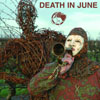Death in June, "The Rule of Thirds"
 For his first proper full-length album in nearly a decade, Douglas P. sets the time machine back to the early 1990s, returning to the guitars-and-windchimes sound that characterized classic Death in June albums such as Rose Clouds of Holocaust and But What Ends When the Symbols Shatter? The only problem is, you can never really go home again, and this album proves it.
For his first proper full-length album in nearly a decade, Douglas P. sets the time machine back to the early 1990s, returning to the guitars-and-windchimes sound that characterized classic Death in June albums such as Rose Clouds of Holocaust and But What Ends When the Symbols Shatter? The only problem is, you can never really go home again, and this album proves it.
For more years than I'd like to count, I was in the unenviable position of having to defend Death in June. First, I had to defend DIJ against accusations that singer/songwriter Douglas Pearce was a card-carrying Nazi sympathizer, and that all of his music is a barely concealed celebration of fascist politics and aesthetics. Then, I had to defend DIJ against accusations that the music itself was awful and derivative: gloomy posturing, miserablist lyrics full of trite symbolism familiar from high school goth poetry, utterly amateur guitar strumming and a massive abuse of reverb to cover over the shortcomings of the music. I knew that all of these criticisms had a germ of truth in them, but I defended DIJ because, very simply, I adored the music.
Albums such as Nada, But What Ends When the Symbols Shatter, and Rose Clouds of Holocaust meant a lot to me during a very formative period of my consciousness. Although all of the elements of the DIJ puzzle might seem risible in isolation, the whole was greater than its parts, and the music had a powerful, haunting effect. DIJ lyrics hinted at archetypal myths, terrifying moments in human history, universal aspects of the human condition, and perhaps most importantly to a young, sexually-confused person, to a kind of masculinity in which homosexuality was not destructive, but an essential part. DIJ's literary references—to Nietzsche, Mirbeau, Bataille, Genet, Mishima—read like a litany of my favorite authors and ideas. His evocation of a mythical idealized Europe in decline, his wintry atmospherics, hints of Norse myth and runic magic were tantalizing. His troubling fetishization of Nazi/fascist aesthetics did not seem to me problematic, as I had experienced similar troubling fantasies myself, and was relieved to find myself not alone. Also, DIJ was associated with a grouping of underground artists that I was utterly obsessed with at the time. However, even at a time when I was listening to Current 93, Coil, Nurse With Wound, Sol Invictus and others, DIJ spoke to me in a way both more profound and more simple than his colleagues. There is a reason that Death in June continues to be one of the most successful cult artists within his underground milieu, and it isn't because all of his fans are Nazi zealots or clueless goths.
However, as the years have progressed, and DIJ have become less relevant—the "apocalyptic folk" sound he helped create along with David Tibet and others has become de rigeur in underground goth scenes—and has gotten stuck in some very alienating tangents (tepid collaborations with Boyd Rice, Albin Julius and others), I have found myself moving closer and closer to the position that I used to defend against. Looking back, the cynics were right to point out that Douglas P. only knows a few chords on the guitar, which he uses repeatedly to mind-numbing effect. They were right to point out that his lyrical symbolism is endlessly recycled. They were correct when they noted that the use of reverb and other studio effects disguised the weaknesses of the compositions themselves. Even though I still say that none of these facts preclude something from having artistic merit, the criticisms have begun to wear me down. It's especially difficult to defend DIJ in the absence of good new music, and the last few non-reissue releases—All Pigs Must Die, the Wolf Pact album, Alarm Agents—have all been mediocre-to-awful. Say what you want about the outrageous Nazi loops of albums like Take Care and Control and Operation Hummingbird (which were heavily criticized at the time of their release), at least they can still be listened to and enjoyed.
This whole overlong preamble is just a way of setting the stage for the long-awaited new DIJ full-length album, The Rule of Thirds. On this album, Douglas P. returns to the sound of the early-to-mid 1990s period, characterized by acoustic guitar strumming, heavy reverb, sparse percussion, dialogue samples and psychedelic production touches. It is a welcome return, but a bittersweet one as well, because if this album achieves any artistic success at all, it is in reminding us of earlier triumphs. Unfortunately, it creates nothing of its own, and even its lyrics seem like they were produced using a random computer algorithm remixing snatches of lyrics from across DIJ's discography. Also, the production isn't quite as strong as that on the 1990s albums, so the low-end is nonexistent, the guitar and vocals have no "presence," and the keyboards and horn fanfares that enriched classic DIJ songs are now absent, and sorely missed. Douglas P. has still not bothered to learn any new guitar chords (or how to fingerpick rather than strum), placing the shortcomings of his guitar skills into bold relief. Many of the guitar parts for these songs are utterly indistinguishable from earlier songs and from each other, and the nasty accusation of self-plagiarism begins to rear its ugly head once again.
All of this might be forgiven if the album weren't also such a laborious, trying listen. The lack of variety in melody and instrumentation begins to wear thin a few songs in, and no relief comes. For an album that is titled after an artistic/photographic principle having to do with aesthetic balance in composition, it strangely lacks any sense of aesthetic balance or proportion itself. Most surprisingly, Douglas P. has consciously moved away from his perennial themes: melancholy, power dynamics, purity, the aestheticization of politics, and veiled homoeroticism. Instead, what we get is a suite of songs that are unmistakably more positive in their outlook, even if they still evoke a winter frost and a sense of desolation. Some of these songs appear to be nothing more than simple love songs addressed to a steady lover, which sound a little incongruous coming out of Douglas P.'s mouth. On "Idolatry," he sings: "You're the emptiness that was meant to be/The missing piece of the puzzle of me...You're the sun and the moon and the stars combined/You'll always be the universe to me." Is he fucking serious with this shit? I'm all for sincere singer/songwriters, but Douglas P.'s newfound, unguarded sincerity seems to come along with an awful lot of schmaltz. I guess there's nothing wrong with schmaltz, but it sounds positively absurd set amid these dark folk surroundings. I honestly don't know what to make of it.
I'm not going to provide a blow-by-blow description of the songs on this album, because none of them warrant the time it would take. Aside from "My Rhine Atrocity," which weaves in some cool dialogue samples, no other tracks stand out to me, even after three listens. On The Rule of Thirds, DIJ commits the cardinal sin of being boring, predictable and nostalgic in an unproductive way. To my mind, this is a worse sin than all the goth posturing and Nazi-adoration one could possibly muster.
samples:



